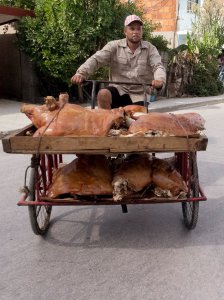Getting into debt is one of the most shameful situations one can ever be faced with. Yet, it constitutes a part of the survival mechanism invented and practiced by man for centuries.
At present, the Cubans are burdened with crippling debts. I’m not referring to the external debt of the country, but to debts incurred by the common people which they owe to the State or to their fellows and compatriots who had become their creditors.

For example, a large part of the Cubans borrowed money within the “energy revolution” when they were forced to replace their old American or Russian refrigerators with new ones of Chinese origin in order to achieve energy savings, which cost them five thousand six hundred and seventy-five Cuban pesos. Needless to say, this short-sighted measure was imposed on them, so they were actually pushed into getting a loan; the National Bank, on the other hand, felt justified to harass the indebted citizens by sending out inspectors who roamed the neighbourhoods from door to door, demanding payments of instalments to the very last peso borrowed, regardless of the economic situation of the borrower.
José Misael Chomat, residing in one of the streets of Jaimanitas, swears that he will never pay his debt for the Chinese refrigerator.
“I had a Philco, an American fridge from 1950, which had never failed me. I didn’t want to change it, but when the chairwoman of the Committee for the Defence of the Revolution came for the third time with a spreadsheet in her hand, she was accompanied by a refrigeration technician and a Police officer. Along with them, a truck full of old refrigerators collected from other houses came, waiting for my Philco. I told them I would not change my Philco, but the Policeman stepped forward and frowned at me. The CDR chairwoman said something like ‘new things are new’ and they took my fridge by force. I remember the technician looking at the old fridge when they were lifting it to the truck, astonished that it still had a factory seal. I doubt that the fridge ever got to the respective warehouse.”
Chomat says that the bank has sent him several demand letters, last of which served as a warning that he would be taken to court.
“It’s my war and I will fight till the end… in honour of my Philco. The Chinese fridge of the Haier brand is already broken, but they still want me to pay the five thousand six hundred and seventy-five pesos.”
There are many Cubans like Chomat who have incurred debts due to the introduction of the Haier brand. Tens of thousands of families borrowed money to buy a set of kitchen appliances that included electric pressure cooker, rice cooker, electric cooker, water heater, milk jug and a set of kitchen utensils. All this for 1,500 Cuban pesos, to be paid in instalments.
Another common way the Cubans run up debts is by borrowing money for housing repairs. Some families will have to pay instalments for the rest of their lives to settle their debts, which is a suffocating and rather unsettling commitment in a country where life is far from easy and the living costs are high. As if this wasn’t enough, the Cubans started taking out loans.
On the other hand, there has been a sharp rise in the number of “garroteros” (loan sharks) in Cuba. They lend money to people living in the same neighbourhood, charging a moderate interest and taking jewellery and home appliances as a collateral, which the lenders unfortunately almost always lose when they are unable to repay their debts. Many Cubans think of “garroteros” as an escape valve which helps them get out of their financial trouble, but later they inevitably become a sword hanging over their heads.
“Another typical reason why the Cubans run up debs is to pay for food. Local butchers have their ‘tried and trusted’ providers who are able to guarantee daily supplies of pork. Families satisfy their food requirements for the weekend, but when it’s time to pay, the purchased and eaten meat costs double the expected price. As they have only made a verbal agreement with the seller, they have no other choice than to pay,” says Esteban, a father of a family.
And what about those who are addicted to alcohol and drugs? What about moral debts and debts of honour?
Of all the debts that the Cubans are currently burdened with, the worst arise from loans for clothing. A large number of families have incurred debts this way. In Cuba, there are people known as “mules” who travel to Panama, Ecuador or Peru, where they buy wholesale clothes, which they later resell in Cuba at exorbitant prices. It’s an extremely lucrative business. Jeans bought in Albrook Mall in Panama City, which normally cost about three dollars, can be sold in Havana for up to 25 CUC. Vendors go from door to door, showing people their merchandise, trying clothes on children, showing them to the parents, putting them under pressure in front of their children. The urgent need to have some clothes and shoes to wear and look good always wins. The usual phrase vendors say before they leave is “we’ll come for the money later…”
Many of such vendors are Christians who preach the gospel and pray for families, for children, for the sick, and ask for blessing, success and peace for the houses they visit. Then, out of the blue, they start unpacking the clothes – as if a miracle happened, there are suddenly trousers, shirts, coats, skirts, blouses… They leave their clients caught in the trap of sin – one that is not included in any Social Contract or in the list of deadly sins in the Bible, robbed of their inner peace and worried about how they will manage to repay the debt this time.
From that moment on, the spectre of debt will haunt them night and day.

Leave a comment